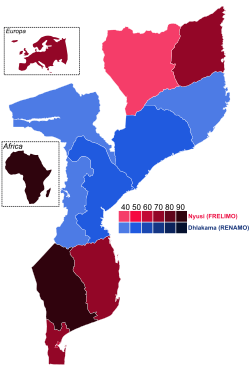Mozambique was a Portuguese colony, overseas province and later a member state of Portugal. It gained independence from Portugal in 1975.
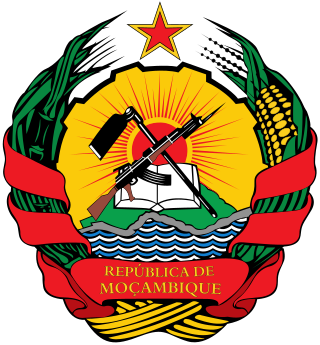
Politics in Mozambique takes place in a framework of a semi-presidential representative democratic republic, whereby the President of Mozambique is head of state and head of government in a multi-party system. Executive power is exercised by the government. Legislative power is vested in both the government and the Assembly of the Republic.
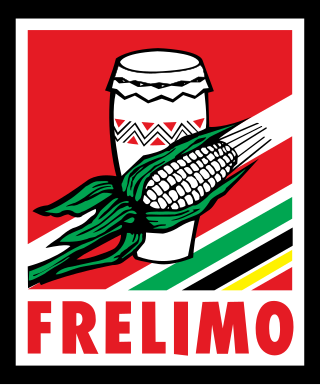
FRELIMO is a democratic socialist political party in Mozambique. It has governed the country since its independence from Portugal in 1975.
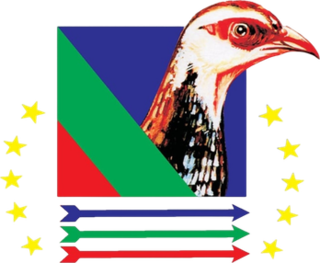
RENAMO is a Mozambican political party and militant group. The party was founded with the active sponsorship of the Rhodesian Central Intelligence Organisation (CIO) in May 1977 from anti-communist dissidents opposed to Mozambique's ruling FRELIMO party. RENAMO was initially led by André Matsangaissa, a former senior official in FRELIMO's armed wing, and was composed of several anti-communist dissident groups which appeared immediately prior to, and shortly following, Mozambican independence. Matsangaissa, who died in 1979, was succeeded by Afonso Dhlakama, who led the organization until he died in 2018. He was succeeded by Ossufo Momade.

The United Nations Operations in Mozambique was a UN peace mission to Mozambique established in December 1992 under Security Council Resolution 797 with the assignment to monitor the implementation of the Rome General Peace Accords agreed upon by the Mozambican president Joaquim Chissano of FRELIMO, the Front for Liberation of Mozambique, and Afonso Dhlakama of RENAMO, the Mozambican National Resistance. The operation was one of the most significant and extensive UN operations and it sought to demobilize and disarm troops, provide humanitarian aid, and oversee the elections. The operation ended in December 1994.

Armando Emílio Guebuza is a Mozambican politician who was the third President of Mozambique from 2005 to 2015.

General elections were held in Mozambique on 1 and 2 December 2004 to elect a president and the Assembly of the Republic. Incumbent president Joaquim Chissano stepped down after 18 years in power, with five candidates running to succeed him. Armando Guebuza of the ruling FRELIMO party won, with over 60% of the vote. FRELIMO also won the Assembly elections, taking 160 of the 250 seats. Turnout for both elections was just over 36%.

Mozambique elects representatives at several levels:

Afonso Marceta Macacho Dhlakama was a Mozambican politician and the leader of RENAMO, an anti-communist guerrilla movement that fought the FRELIMO government in the Mozambican Civil War before signing a peace agreement and becoming an opposition political party in the early 1990s. Dhlakama was born in Mangunde, Sofala Province.

The Mozambican Civil War was a civil war fought in Mozambique from 1977 to 1992. Like many regional African conflicts during the late twentieth century, the impetus for the Mozambican Civil War included local dynamics exacerbated greatly by the polarizing effects of Cold War politics. The war was fought between Mozambique's ruling Marxist Mozambique Liberation Front (FRELIMO), the anti-communist insurgent forces of the Mozambican National Resistance (RENAMO), and a number of smaller factions such as the PRM, UNAMO, COREMO, UNIPOMO, and FUMO.

Filipe Jacinto Nyusi is a Mozambican politician who was the fourth president of Mozambique from 2015 to 2025. He has also served as the Chairman of the Southern African Development Community from 2020 to 2022. During his time in office, President Nyusi promoted peace and security, and signed multiple agreements with the main opposition parties, RENAMO, to bring a definitive and lasting peace to Mozambique.

General elections to elect the president, Assembly of the Republic, and Provincial Assemblies was held in Mozambique on 28 October 2009. Incumbent President Armando Guebuza ran for re-election as the FRELIMO candidate; he was challenged by opposition leader Afonso Dhlakama, who had stood as the RENAMO candidate in every presidential election since 1994. Also standing were Daviz Simango, the Mayor of Beira, who was a RENAMO member before founding his own party, the Democratic Movement of Mozambique (MDM), earlier in 2009.
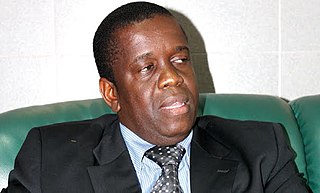
Daviz Mbepo Simango was a Mozambican politician who was Mayor of Beira from 2003 to the day of his death in February 2021. He was also the President of the Democratic Movement of Mozambique (MDM). He was son of Uria Timoteo Simango the first Vice-President of FRELIMO and Celina Tapua Simango. He joined the main opposition party RENAMO in 1997 and became Mayor of Beira in 2003 as its candidate. On March 6, 2009, he founded a new party, the Movimento Democrático de Moçambique, or MDM.

The RENAMO insurgency was a guerrilla campaign by militants of the RENAMO party and one of its splinter factions in Mozambique. The insurgency was widely considered to be an aftershock of the Mozambican Civil War; it resulted in renewed tensions between RENAMO and Mozambique's ruling FRELIMO coalition over charges of state corruption and the disputed results of the 2014 general elections.
Gilles Cistac was a French-Mozambican lawyer specialised in constitutional law. He was shot and killed and political motives were suspected. The RENAMO party organised protests.

Ivone Soares is a Mozambican politician. She is the deputy leader of Mozambican National Resistance and leads its parliamentary party in the Assembly of the Republic. Soares is also a member of the Pan-African Parliament where she is vice-president of youth. She was the target of an attempted assassination in September 2016.

General elections were held in Mozambique on 15 October 2019. During the leadup to the elections, assassinations and significant intimidation of prominent leaders of opposition parties and election observers were alleged. In addition, state resources, media, and aid for cyclone victims were also alleged to be used in favour of the ruling party (FRELIMO) and its candidates. Local elections observers, civil society organizations, the Commonwealth Observer Group, the European Union Election Observation Mission, and several national and international entities classified the elections as rigged. Nevertheless, the incumbent president Filipe Nyusi of FRELIMO was declared re-elected with 73% of the vote. The main opposition party RENAMO as well as the other oppositions parties involved in the elections contested the results, claiming there were numerous irregularities, and accusing FRELIMO of "massive electoral fraud", including hundreds of thousands of "ghost voters". As evidence for the international community, Ossufo Momade, the president of the main opposition party RENAMO, transported to Europe a box filled with vote ballots that had been marked in favor of the incumbent president Filipe Nyusi of FRELIMO before the commencement of voting. Despite these occurrences, the international community largely ignored any concerns of fraud, and gradually countries started recognizing the incumbent president Filipe Nyusi of FRELIMO as the winner of the elections.

The concept of human rights in Mozambique is an ongoing issue for the African country, officially named the Republic of Mozambique. For more than four centuries, Mozambique was ruled by the Portuguese. Following Mozambique’s independence from Portugal came 17 years of civil war, between RENAMO and FRELIMO, until 1992, when peace was finally reached. Armando Guebuza was then elected president in 2004 and re-elected in 2009, despite criticisms that he lacked honesty, transparency, and impartiality. This sparked a series of human rights incidents including unlawful killing, arbitrary arrests, inhumane prison conditions, and unfair trials. There were also many issues regarding freedom in relation to speech and media, internet freedom, freedom of peaceful assembly, and discrimination and abuse of women, children and people with disabilities. Many of these issues are ongoing and have become current human rights violation is for Mozambique.

General elections were held in Mozambique on 9 October 2024 to elect the president, the 250 members of the Assembly of the Republic and members of the ten provincial assemblies.
Since 11 October 2024, demonstrators in Mozambique have mounted protests against the 2024 Mozambican general election.




